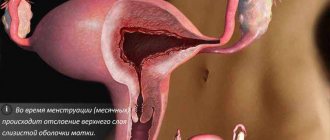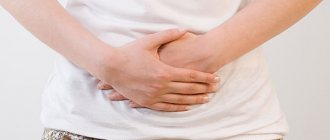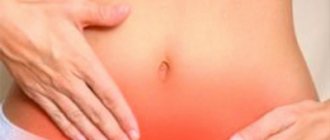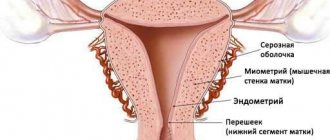All women experience their periods differently. The process occurs asymptomatically or with obvious signs of PMS - pain in the lower abdomen, weakness, irritability, poor health, rapid mood swings.
Sometimes you feel sick before your period, vomiting or diarrhea. Today we will look at whether this phenomenon is normal and why it occurs.
Nausea as a symptom of PMS
The first signs of PMS in the fair sex occur 4 to 7 days before the onset of bleeding. But they can appear on the same day and pass unnoticed, slightly disturbing the woman. The severity of the syndrome depends on the sex hormones – progesterone and estrogen. Their activity determines the state of the body on the eve of menstruation.
As the uterus prepares for the fixation of a fertilized egg, the level of these hormones increases. If conception does not occur, the amount of estrogen remains unchanged. Progesterone levels drop sharply. Hormonal imbalance worsens a woman's well-being.
On the eve of bleeding, symptoms such as:
- Weakness.
- Nausea and/or vomiting.
- Soreness of the mammary glands.
- Pain in the lower abdomen and lower back.
- Dizziness.
- Pimples on the skin.
Discomfort occurs against the background of hormonal fluctuations, changes in blood pressure, stress, diets, and overwork. Sometimes psycho-emotional shocks are to blame. The answer to the question whether you can feel sick before your period is positive. However, the factors that provoke PMS are not always harmless.
Nausea before menstruation may occur due to the location of the uterus. The displacement of the organ backward puts pressure on certain points in the nervous system. As a result, the woman experiences severe pain in the lower body and nausea.
Chills before menstruation
The physiological cause of chills is a change in the level of progesterone in the blood. It is this hormone that influences thermoregulation processes. Progesterone synthesis is associated with specific days of the cycle. About 7 days before the start of menstruation, the concentration of progesterone increases, and when they end, it decreases. PMS can be accompanied by chills and Raynaud's syndrome. In this case, minor vascular spasms are observed. The hands become numb, and this condition is accompanied by the appearance of goose bumps.
But sometimes this symptom can signal the occurrence of a serious pathology. When to see a doctor? Here are possible causes of chills that require intervention:
- endometritis (inflammation of the uterus). Main signs: pain during menstruation, increased body temperature to critical values, increased heart rate, increased number of leukocytes in the blood;
- adnexitis (inflammatory process in the appendages). It is characterized by the presence of pain in the lower abdomen, nausea, and weakness. Chills are combined with a strong increase in temperature.
Causes of nausea before menstruation
Why you start feeling sick even before your period starts, you can ask your gynecologist. The specialist will list all the causes of nausea before menstruation and tell you how to relieve the discomfort. The etiology of the problem is:
- Dysmenorrhea.
- Endocrine disorders.
- Early pregnancy.
- Gastrointestinal diseases.
- Nervous system disorders.
- Increased physical activity.
- Taking hormonal contraceptives.
Let's consider these factors in detail.
Dysmenorrhea
According to medical statistics, dysmenorrhea causes nausea in 70% of women who are expecting their period. Dysmenorrhea is especially troubling for young nulliparous girls. Their PMS is so severe that poor health does not allow them to work fully.
Nausea before menstruation with dysmenorrhea can be accompanied by insomnia, dizziness, sweating and excruciating pain in the lower abdomen, which radiates to the lower back and groin area.
Dysmenorrhea is typical for young girls with an unsettled cycle after menarche. It develops against the background of stress, bulimia, anorexia and depression. In adult women, the problem is explained by sports activities and heavy physical labor. Dysmenorrhea can also signal the development of endometriosis.
The diagnosis of dysmenorrhea is confirmed based on a comprehensive examination:
A woman’s well-being is also affected by the increased amount of serotonin concentrated in the cerebrospinal fluid. For this reason, blood pressure rises and nausea bothers you. Sometimes discomfort occurs due to severe pain associated with inflammatory processes inside the body.
Intermittent nausea in the absence of other PMS symptoms sometimes has a cause such as emotional distress experienced on the eve of menstruation. Sedatives will help eliminate the symptom.
Endocrine pathologies
Improper functioning of the thyroid gland leads to hormonal imbalances and causes nausea before menstrual flow. The provoking factor is an excess of prostaglandin, which dominates progesterone. On the eve of menstruation, these changes are felt most acutely. This is where nausea comes from.
Endocrine disorders cannot be ignored, because they are dangerous due to disorders of internal organs, the development of infertility and diabetes. A timely visit to a specialist and strict adherence to treatment regimens will help you avoid problems.
Pregnancy
Mild forms of toxicosis with nausea and dizziness appear within a week after fertilization.
The sense of smell increases due to changes in the hormonal system. Unpleasant odors for a woman can provoke nausea and even vomiting. The first symptoms of pregnancy resemble PMS. Therefore, when you feel sick a week before your period, you need to take a closer look at yourself and observe the signs of the birth of a new life.
What causes nausea during pregnancy:
- Fatigue.
- Unstable mood.
- Scanty discharge from the genital tract is scarlet in color.
- Pain in the lower abdomen.
- My head is spinning.
- The mammary glands swell and a tingling sensation occurs.
- Good appetite along with slight weight loss.
There are two ways to diagnose pregnancy in the early stages. In laboratory conditions, this means donating blood for hCG. The second option is to take a pregnancy test at home. Expensive tests are more sensitive than budget ones. Conception can also be judged by the basal temperature chart, if it is regularly measured.
Digestive system diseases
If a woman is seen by a gastroenterologist, nausea before menstruation will cause concern in chronic gastritis, cholecystitis and pancreatitis.
Nausea can lead to vomiting on any day of the cycle, but before the next bleeding the discomfort intensifies. Weakened immunity and hormonal changes aggravate diseases during the premenstrual period. At other times of the cycle, symptoms subside.
In addition to nausea, pathologies of the digestive tract are manifested by other unpleasant symptoms:
- Loss of appetite.
- Constipation or diarrhea.
- Dizziness.
- Acute pain in the area of the pancreas and the stomach itself.
Tests of urine, blood and feces will help to establish the true causes of nausea in the middle of the cycle and closer to menstruation. Sometimes your health is worsened by helminthic infestations. It is imperative to get rid of them. The doctor will tell you what and how to do.
Nervous system problems
Nervous tension, excitement and being in a stressful situation can be characterized as poor emotional well-being. It negatively affects the condition before menstruation. Nausea occurs due to anxiety.
Psychological problems, unreasonable tears and demonstration of one’s own weakness require the intervention of an experienced psychotherapist. In this case, nausea will not go away without the help of a specialist.
Nausea and dizziness before menstruation may indicate a violation of the vestibular system, or they indicate a reaction of the body that is susceptible to changes in climate or daily routine.
Physical exercise
Excessive physical activity and performing strength exercises make your periods heavy and make you feel worse before they start. Walking in the fresh air, swimming and yoga can help women relieve PMS.
Hormonal contraceptives
The use of hormonal contraceptives, inconsistent with the gynecologist, is fraught with intermenstrual discharge, nausea and pain in the lower abdomen.
Symptoms appear due to hormonal imbalance, which is caused by taking contraceptives. A hormonal surge occurs monthly in any case, but in combination with hormonal medications, PMS symptoms are felt more clearly.
Distortion of hormonal status leads to nausea, vomiting and other disorders. If such symptoms are present, it is necessary to discontinue the drug and choose the optimal method of birth control.
What to do if you feel sick before your period
If a woman has a headache and nausea shortly before her period, and the discomfort occurs constantly, she needs to consult an experienced doctor who will understand the situation.
At his discretion, the specialist will select an analgesic, antispasmodic, sedative or anti-inflammatory drug. Adequate therapy minimizes the manifestation of the unpleasant syndrome.
To prevent PMS from debilitating the body, you need to switch to light foods and increase your consumption of vegetables and fruits. Fatty, fried and too spicy foods should not be included in the diet.
Can you feel sick before your period? This is what interests girls of reproductive age who are not planning a pregnancy in the near future. Gynecologists claim that the symptoms of PMS are different, and the occurrence of this condition is not excluded. However, in order to understand why you feel sick before your period, if you haven’t felt sick before, you need to undergo a medical examination; the symptom may indicate pregnancy or progression of the disease.
It is worth noting that girls feel the imminent onset of regular bleeding within a few days. It is not difficult to recognize them, because nagging pain appears in the genital area, irritability is present, and fluctuations in body weight are noted. Let's take a closer look at what to do if you feel sick before your period and why this condition develops.
Many girls experience nausea during PMS, and it is often triggered by a hormonal imbalance in the body. Along with this, periodic headaches, soreness of the mammary glands, psycho-emotional instability are also disturbing, and it is possible that there is a disturbance in the gastrointestinal tract, which manifests itself in the form of diarrhea and vomiting.
If you feel sick before your period, the reasons for the development of the condition are related to the restructuring of the body, then after the start of bleeding, the symptom in question will pass. But the opposite situation is not excluded. In this case, it is worth thinking about the progression of diseases, which may also not be related to gynecology.
A woman is recommended to undergo a general medical examination, because the symptom often appears with food infections that disrupt the functioning of the entire body, gastritis and pancreatitis, and anemia. In the latter case, it is imperative to replenish the iron balance, otherwise there will be a significant decrease in hemoglobin levels.
With the progression of such pathologies, nausea in PMS is often accompanied by belching, pain in the lower abdomen, heartburn, and bowel dysfunction. Since this symptom can hardly be called dangerous, most women do not attach much importance to it and associate the deterioration of their general condition with impending bleeding.
When you feel sick a week before your period, the reasons may not be so serious. We should not exclude the possibility that the symptom appeared after a stressful situation or negative emotional shock. Knowing why PMS causes nausea, it is necessary to remember other characteristic signs of the syndrome:
- A woman experiences pain in the lower abdomen;
- Some girls feel pain in the lumbar region;
- There is constant irritability;
- The functioning of the gastrointestinal tract is disrupted;
- Sometimes rashes appear on the skin.
Since you may feel sick before your period, girls should not rule out the possibility of pregnancy. Therefore, it is necessary to do a test to determine it, or get tested for hCG. If the diagnosis is confirmed, then during PMS the nausea appeared due to a sharp jump in progesterone.
Why do you feel nauseous?
The urge to vomit is one of the manifestations of hormonal imbalance that occurs in the female body under the influence of various factors. These include pregnancy, endocrine system disorders, psycho-emotional or physical stress, and incorrect selection of contraception. A woman may also feel nauseous due to problems with the digestive tract, but these conditions are also caused by hormonal imbalance. The exact cause of the malaise can be determined solely on the basis of the answers to the examination completed.
Dysmenorrhea
One of the reasons why you feel sick before your period is the pain syndrome that occurs during PMS. It covers the lower abdomen, lower back and sacrum, and is accompanied by a slight increase in body temperature, dizziness, weakness, and a decrease in blood pressure. The reasons for the development of the condition are polymorphic, but the main ones are: previous curettage of the uterine cavity, the onset of endometriosis or endometritis. Other factors that cause dysmenorrhea, and as a result, nausea, are the accumulation of serotonin in the cerebrospinal fluid (cerebrospinal fluid).
Such a hormonal imbalance contributes to an increase in intracranial pressure - the woman feels dizziness, headache, and the urge to vomit. If nausea occurs frequently on the eve of menstruation, the patient should undergo an ultrasound of the pelvic organs with an emphasis on the condition of the uterus, and donate blood for analysis. Diagnostics will eliminate the presence of pathology in the parts of the female reproductive system.
Choose a specialist, read reviews and make an appointment with a gynecologist online
Endocrine pathologies
Thyroid dysfunction is the cause of nausea on the eve of menstruation. Due to weakened or increased activity of this organ, the concentration of prostaglandins in the blood increases, which helps to reduce progesterone levels. An imbalance of hormones in the body is most acute on the eve of menstruation, and is manifested by such severe symptoms as:
- dyspepsia
- bloating
- weakness
- dizziness
- irritability
- darkening before the eyes
If you do not stop the endocrine disease that causes deterioration in well-being in the period before menstruation, it will cause the development of new health problems. It is recommended to contact a specialist and undergo an examination, starting with a blood test to determine its glucose level.
Pregnancy
Toxicosis manifests itself as nausea of varying degrees of intensity. This is a condition that occurs as a response of the body to the hormonal changes that occur in the female body after conception. You should pay attention to the signs that accompany nausea. The onset of pregnancy is indicated by:
- Increased fatigue
- Sudden mood swings
- The appearance of a small amount of bloody vaginal discharge
- Dizziness
- Swelling and increased sensitivity of the breasts, pain in the nipples and areolas
- Increased appetite
Pregnancy can be confirmed in the early stages (even from the first day of a missed period) in 2 ways - by donating blood to determine hCG, or by performing a test (at home).
Digestive system diseases
On the eve of menstruation, gastritis, pancreatitis or cholecystitis manifest as dyspeptic symptoms (nausea, vomiting, loss of appetite). Inflammation of the mucous membrane of the stomach, pancreas and gall bladder is listed. During PMS, a redistribution of hormones occurs in the female body. The process contributes to the exacerbation of chronic inflammatory processes, which include the listed diseases.
In this case, the woman feels sick, but also:
- Excessive salivation
- Weakness, dizziness
- Diarrhea or constipation
- Pain in the epigastric region, on the right side
- Decreased appetite
- Bitter taste in mouth
- Strengthening intestinal motility
In order to prevent aggravation of the underlying disease and prevent repeated deterioration of well-being before menstruation, you need to consult a doctor: undergo diagnosis and treatment.
Nervous system problems
Psycho-emotional shock leads to the release of cortisol into the blood, and this hormone increases the synthesis of progesterone, causing an excess of the permissible norm. An imbalance of biologically active substances contributes to the development of nausea and often vomiting. The second reason why dyspeptic symptoms occur against the background of stress and psychological fatigue is an increase in blood pressure. During a hypertensive crisis, you always feel sick, and in addition, you are worried about weakness, dizziness, headache, impaired vision and hearing.
Pregnancy
Doctors clearly give a positive answer to the question of whether there can be nausea before menstruation. At the same time, the symptoms of PMS in some women are very similar to the signs of pregnancy, while in others, on the contrary, they are radically different. Some representatives of the fairer sex feel only minor pain in the lower abdomen, while others face more serious problems.
If you feel sick a week before your period, it is very important to make sure you are pregnant. First of all, you can pay attention to indirect signs:
- Frequent urge to urinate;
- Stool upset, diarrhea;
- Drowsiness;
- Increased fatigue;
- Nausea and vomiting in the morning;
- Changing taste preferences.
When a woman feels sick during PMS and notices that her periods are late, it is necessary to do a pregnancy test or hCG blood test about 3-5 days later. Until the diagnosis is confirmed or refuted, it is better not to take any pills so as not to harm the embryo or interfere with its implantation.
Knowing whether nausea occurs before menstruation, and if it is not associated with pregnancy, women also wonder how to help themselves. The fact is that the symptom can have varying degrees of severity, and if it is high, then along with it diarrhea, dizziness, and pain in the lower abdomen will also occur.
All this significantly reduces the quality of life during premenstrual syndrome. A woman needs to see a gynecologist who will recommend certain therapeutic measures. Self-therapy can be dangerous and will cause complications or worsen the general condition.
When figuring out whether PMS can cause nausea and how to get rid of the unpleasant symptom, you should first of all pay attention to your diet. If you regularly eat the “wrong” food, it can be stressful for the body, which will definitely disrupt its functioning.
A woman needs to give up spicy, fried and fatty foods. Also during this period it is not recommended to drink water or carbonated drinks, strong tea and coffee. It is better if natural juices or herbal teas are chosen as a replacement. In this way, you can relieve the body, and gradually it will work better.
If girls are actively involved in sports, then they should reduce the level of intensity of exercise and not perform strength exercises in the gym. It is definitely necessary to surround yourself with positive emotions, protect yourself from stressful situations, and normalize your work and rest schedule. In the case of nervousness, teas made from mint, chamomile, lemon balm and sage help well.
A visit to the gynecologist is extremely necessary, even if the woman managed to normalize her condition on her own. Of course, there is no need to visit a doctor every month, but this should be done at least once every six months. Thanks to this, it will be possible to understand whether there is a hidden danger in this symptom. Or it is just an individual reaction to approaching bleeding.
Every woman knows what menstruation is. Often this period is accompanied by unpleasant sensations, temperature fluctuations, and emotional instability. Each body copes with internal changes differently. Women do not always know what to do if they feel sick before menstruation, and, most importantly, why this happens, what independent measures to take and who to contact.
Why does my stomach hurt before my period?
In normal health and proper functioning of all metabolic mechanisms in the body, menstruation should not cause discomfort. The nature of pain during PMS in the stomach is aching, pulling, rather reminiscent of discomfort. If there is a history of gastritis or an ulcer, the pain becomes acute with pain in the epigastric region.
Premenstrual syndrome
Painful sensations can begin 10–14 days before menstruation and continue throughout the critical days.
The first action of a woman or mother of a teenage girl: undergo diagnostics of the reproductive organs and endocrine system in order to exclude pathologies whose symptoms are similar to PMS. Painful symptoms of premenstrual syndrome are accompanied by the following additional manifestations:
- aches in the lumbar region, tailbone;
- gastrointestinal upset, diarrhea, constipation;
- migraine;
- sore nipples;
- flatulence (bloating);
- swollen ankles, hands or face.
Such discomfort is usually associated with an abnormal position of the uterus or its congenital bend, and also occurs due to improper functioning of the glands of the reproductive system.
Psycho-emotional symptoms of PMS:
- sudden mood swings;
- frequent depression;
- insomnia;
- emotionality;
- photosensitivity;
- noise aversion;
- change in libido;
- irritability.
PMS often occurs as a subsequent reaction to an abortion. These signs may indicate the manifestation of premenstrual syndrome, and diseases or dysfunction of the thyroid and adrenal glands, which are responsible for the hormonal balance of the body.
Pregnancy
Symptoms of early conception are very similar to symptoms of PMS. The main difference between cyclic syndrome and pregnancy is delayed or scanty implantation bleeding, mistaken for menstruation. It is recommended to take a pregnancy test several days in a row.
Main signs of premenstrual syndrome
PMS, or premenstrual syndrome, has had its unpleasant effect on every representative of the fair sex at least once. More than 75% of women experience regular manifestations of PMS. Since each body is individual, symptoms can appear both on the day the period begins, and several days in advance. It is not uncommon for women to experience symptoms of PMS within a week or a little more. The main negative symptoms of premenstrual syndrome are:
- General weakness and high fatigue.
- Headache.
- Small rashes, acne.
- Pulling sensations in the lower abdomen.
- Excessive irritability and emotionality.
- Breast enlargement, increased sensitivity to touch.
- Strong appetite or, conversely, its dullness.
- Dizziness.
- Nausea and vomiting.
During her period, a woman may notice that her mood changes rapidly and even seemingly ordinary incidents can cause tears or laughter.
This is absolutely normal, since the body is rebuilt before and during critical days. Possible causes of nausea during or before menstruation:
- The influence of hormones.
- Presence of pregnancy.
- Food poisoning.
- Intense physical activity.
- Disturbances in the functioning of the digestive system.
- Taking oral contraceptives.
- Adolescence.
- Taking a hot bath, going to the sauna, etc.
- Dysmenorrhea.
Atypical form of PMS
Chills are caused by an atypical form of premenstrual syndrome (PMS). There are 3 types of this phenomenon, but a girl can freeze only with one of them: hyperthermic. It is characterized by an increase in body temperature before menstruation to 38 degrees. With the onset of menstruation, this figure drops.
This phenomenon is associated with an increase in progesterone levels on the eve of critical days and its decrease when bleeding occurs. In this case, the woman shudders before her period due to an increase in temperature.
The influence of hormones on a woman’s body
And yet the question of why one feels sick before menstruation remains open. One of the supposed reasons is the effect of female hormones (progesterone and estrogen), which begin to be actively produced during PMS. The body is being rebuilt, the egg is preparing for fertilization, and the level of hormones increases significantly. But since there was no conception process, progesterone in its basic amount decreases, but estrogen levels do not change. Such an imbalance can easily cause nausea and general weakness.
Possible pregnancy
Since the symptoms of premenstrual syndrome are similar to early signs of pregnancy, it is necessary to make sure that conception has not occurred. Of course, the presence of a fetus can be completely ruled out if you have not had sexual intercourse since your last period. A delay is one of the markers of the onset of pregnancy, however, if nausea and malaise suddenly begin to bother you without interrupting your usual cycle, it is better to play it safe. determine pregnancy in the following ways:
- A trip to the gynecologist for an examination.
- Ultrasound.
- Pregnancy test.
- Blood test for hCG hormone levels.
And if the first two methods are completely ineffective in the first weeks after conception, then the last two will help determine the presence or absence of pregnancy. Advice: analysis for hCG levels is more effective, however, if you decide to use tests, it is better to buy several packages from different manufacturers to check and confirm the results.
Food poisoning
There is a possibility that abdominal pain and nausea are not caused by PMS, but by ordinary poisoning, which provoked discomfort and worsened the condition. Toxic substances cause irritation of mucous membranes, reduce immunity and negatively affect the functioning of internal organs. In addition to nausea, the stomach may begin to twist and the following symptoms may acutely appear (individually or in combination):
- Severe dizziness.
- Heat.
- General weakness.
- Unusually strong thirst.
- Vomit.
In this case, you should immediately consult a doctor and start taking appropriate medications. With severe poisoning, the symptoms manifest themselves much more clearly than with PMS. Important: there is no need to put off going to a specialist, as poisoning is a serious blow to the body.
Too much exercise
An active lifestyle is the key to good health and a bright mood, but too intense exercise and activities can negatively affect a woman’s condition during premenstrual syndrome.
The fact is that when overloaded, the uterus, which at this time is larger than usual, begins to put pressure on the vertebrae, which, accordingly, leads to unpleasant sensations. Women should also remember that constant overwork can disrupt the normal course of the menstrual cycle, as well as provoke the appearance of symptoms of premenstrual syndrome. In modern society, every representative of the fair sex wants not to get sick, to be fit and strong, but it is worth remembering that overload will not lead to anything good and you must definitely learn to listen and hear your body.
Causes of discomfort
Every girl feels the approach of her menstrual cycle. But why is this happening? The general state of health deteriorates, weakness and lethargy appear, and depression sets in. The culprits for this are estrogen and progesterone. It is their level that begins to “go off scale” during the period of ovulation, when a woman has the greatest chance of becoming pregnant.
If pregnancy has not occurred within a month, the body gives the command to lower the level of these two hormones. But if the concentration of estrogen instantly drops, then progesterone is not so rapid. It is its concentration that leads to changes in well-being in a woman’s body.
It just so happens that everything in our body is in tandem. And when one component is missing, the overall condition worsens.
Problems in the gastrointestinal tract
In most cases, abdominal pain and nausea once a month are a sign of an imminent period. However, it is possible that even after the end of menstruation, unpleasant symptoms will continue to bother you. If a woman feels constant spasms, it is necessary to pay close attention to the nature of the pain, its strength and, of course, the place of manifestation.
Most often, malfunctions in the digestive system are observed in the stomach area, since this organ takes on the main role in processing food. Cramps during and before menstruation - pulling and aching. The pain manifests itself in the lower abdomen, exactly where the organs of the reproductive system are located.
If the discomfort is acute, pulsating, you should consult a specialist. Pain in the stomach can signal gastritis or heartburn, in the intestines - about obstruction, in the lower right corner - about inflammation in the appendix area. You should not endure pain, as this can lead to serious health problems.
Drinking regime during menstruation
On critical days, with painful symptoms in the stomach area, it is recommended to drink herbal teas, jelly, compotes, juices and just water. It is advisable to drink no more than 1 liter of liquid per day to avoid swelling. They usually drink water after meals or between meals.
It is forbidden to brew tea and coffee that is too strong. You also need to forget about soda. You can drink non-carbonated mineral water, which reduces stomach acidity (Borjomi, Essentuki). Herbal soothing teas made from mint or lemon balm are useful.
During painful menstruation, it is advisable to eat dietary foods and drink tinctures of medicinal herbs. To relieve pain, spasms of the uterus and stomach, it is recommended to take analgesics and antispasmodics.
All these remedies should be used in the absence of serious pathologies in the genitals and gastrointestinal tract. If the pain becomes unbearable and does not go away after the end of your period, it is recommended to consult a doctor.
We recommend watching the video:
Read along with this article:
- What to drink if your stomach hurts: a review of drugs
- Bloating and lower abdominal pain: main causes and treatment
- Gastrocardiac syndrome or Roemheld syndrome
- How to relieve stomach pain: first aid
- Severe pain in the left side of the lower abdomen: what may bother you
- The reasons for the feeling of heaviness and fullness in the stomach...
- Where does the pancreas hurt: causes of pain, symptoms...
- Intestinal spasms: causes, symptoms, treatment and prevention
- Severe stomach pain: what to do, how to provide first aid...
Taking birth control pills
Many modern women who are in long-term relationships with one sexual partner prefer pills as contraceptives. Birth control pills activate the production of certain hormones that prevent fertilization. Each female body is strictly individual, therefore, only a gynecologist can prescribe correct, harmless contraceptives in the form of tablets after an examination and collection of tests.
Often, women do not turn to a specialist and purchase pills based on the price or advice from friends and relatives. Inappropriate birth control causes an imbalance, raising hormone levels to unacceptable levels.
In this case, a woman may feel nauseous and shivering before her period begins.
Nausea in teenage girls
It often happens that girls who have recently started menstruating complain that they are bothered by nausea during menstruation. Since the body undergoes a complete restructuring during puberty and the menstrual cycle gradually becomes established, in addition to nausea, the following symptoms may occur:
- White marks on underwear from discharge.
- Drawing cramps in the lower abdomen.
- Increased skin oiliness.
- The appearance of rashes and acne.
- Breast augmentation.
- Deterioration of mood and general well-being.
- Weakness.
Hot bath
Of course, a hot bath after a hard day at work, especially with the addition of scented bombs or salt, is very pleasant. However, gynecologists strongly recommend that women limit themselves to this pleasure while waiting for their next period.
Excessive body heat can cause uterine contractions, leading to nausea and worsening general condition. Also, such a water procedure can activate internal processes and cause increased bleeding ahead of schedule, since high temperature contributes to the dilation of blood vessels. You can avoid such unpleasant consequences if you limit yourself to a regular shower just before your period arrives.
Diagnosis: dysmenorrhea
More than half of women are susceptible to dysmenorrhea (this is especially true for young girls, whose bodies are more susceptible to internal changes). When symptoms of premenstrual syndrome appear, representatives of the fair sex feel so bad that they are not even able to work. In addition to nausea, girls feel severe pain in the lower abdomen, which moves to the lumbar and perineal area. In addition to weakness, insomnia and sweating, as well as dizziness, may occur.
Dysmenorrhea actively manifests itself after stress, anorexia, bulimia, and depression. A weakened mental state reduces the body’s immunity, contributes to the disruption of the menstrual cycle and the activation of increased symptoms of PMS. Adult women are susceptible to dysmenorrhea if they constantly overload themselves, engage in hard work, or overwork themselves in training. Important: dysmenorrhea can act as a signal that warns of the active development of endometriosis. Dysmenorrhea can be determined by taking tests and a set of the following procedures:
Important: if you feel nausea and chills, exclude the influence of such factors as:
- Excessive intake of alcoholic beverages.
- Unstable psychological state, stress.
What to do to reduce nausea
There are several ways that will help relieve unpleasant symptoms and normalize the overall health of a woman:
- First, it is necessary to immediately exclude pregnancy. To do this, you can refer to the methods given above.
- Secondly, it is important to normalize your diet. Provide the body with fresh vegetables and fruits, drink more water, eliminate alcohol, carbonated drinks and fried, salty or spicy foods from the diet.
- Thirdly, you need to avoid intense physical exercise, as it can not only increase pain, but also provoke heavy bleeding. Instead of too active activities, you can do yoga, which not only normalizes your psychological and emotional state, but also shapes your posture and increases muscle elasticity.
If nausea and pain are very bothersome, you can go to the pharmacy and buy painkillers and drugs that normalize internal processes. However, it is strongly recommended that you consult your healthcare professional before purchasing medications. A thorough examination will help explain why you feel sick before your period and what are the causes of this phenomenon. The doctor will also help with the choice of tablets based on the patient’s health condition. You should not self-medicate, as each organism has individual characteristics.
Every woman who has experienced the symptoms of premenstrual syndrome herself understands how important it is to value and take care of her own health.
When preparing for critical days, the body needs special care and attention. The main thing for every representative of the fair sex is not only to learn to hear her own body, but also to respond in time to manifestations of feminine nature.
For most women, nausea along with cessation of menstruation is a sign of pregnancy. However, nausea before menstruation can also occur for other reasons. This phenomenon often indicates the development of some pathologies. If this has not happened before, you should immediately consult a doctor. Why do you feel sick before your period? In what cases is nausea caused by pregnancy? How to get rid of this problem?
Preventive recommendations
It is recommended to spend more time in the fresh air. Physical activity is useful, but it should be moderate: you should not overdo cardio and strength training. Cycling, roller skating and brisk walking are allowed. You can and should swim before your period. You should also learn to relax. To do this, it is recommended to master several breathing exercises.
- Folk remedies for the treatment of VSD
- Constant weakness in the body. What to do?
- How to properly treat VSD
- Why does nausea occur during VSD and how to deal with it
Nausea as part of premenstrual syndrome
Premenstrual syndrome is a complex symptom complex, which is characterized by a certain periodicity and occurrence before menstruation. In some women it appears a week before menstruation, in others - on the eve or on the day of bleeding. This condition is characterized by psycho-emotional, autonomic and endocrine disorders that negatively affect a woman’s quality of life.
Some women begin to feel nauseous 1–1.5 weeks before the onset of menstruation. This condition is also accompanied by the following symptoms:
- attacks of vomiting and dizziness;
- fast fatiguability;
- weakness;
- painful sensations in the abdomen (the lower abdomen usually hurts);
- skin rashes;
- change in appetite (it can be either increased or completely absent);
- depression of state.
These disorders occur against the background of hormonal changes. These symptoms do not pose a threat to women's health and, as a rule, go away on their own after the onset of menstruation.
Provoking factors
PMS and VSD are quite an explosive combination. Against the background of hormonal fluctuations, the main signs of VSD intensify: this occurs both during premenstrual syndrome and upon the onset of menstruation.
This occurs due to hormonal instability provoked by the peculiarities of the cycle.
Young women susceptible to vegetative-vascular dystonia experience delayed menstruation. This also signals a hormonal imbalance and requires special attention.
Menstruation with VSD is problematic in:
- women with severe underweight;
- women during pregnancy (or after an abortion, during menopause);
- teenage girls during the formation of the cycle.
Can I feel sick because I'm pregnant?
If a woman has not previously vomited before her period, most likely we are talking about pregnancy. In the early stages of gestation, an ultrasound examination will not be able to confirm the fact of fertilization of the egg. To do this, you can use one of the following methods:
- donating blood for analysis, the results of which, in case of fertilization, will show the presence of human chorionic gonadotropin;
- pregnancy test - only highly sensitive devices can confirm its occurrence in the early stages;
- measurement of basal body temperature.
In addition to attacks of nausea, the following signs usually indicate pregnancy:
- delay of menstruation;
- destabilization of the psycho-emotional state (frequent mood swings, tearfulness, irritability);
- fast fatiguability;
- tingling in the uterus;
- hypersomnia (excessive sleepiness during the day);
- disturbance of sleep and wakefulness;
- change in sexual desire up or down;
- heaviness in the pelvic area and lower abdomen;
- changing eating habits;
- discomfort in the lumbar spine;
- migraine;
- increased sensitivity of the mammary glands;
- hyperosmia (exacerbation of smell).
If you suspect pregnancy, it is recommended to immediately give up all bad habits: smoking (including passive smoking), drinking any alcohol-containing drinks and narcotic substances. In addition, it is necessary to stop taking medications, especially potent ones. You can resume their use only after your doctor's permission.
Nausea before menstruation
Let's start with what nausea is. Contrary to general belief, nausea is not only a consequence of eating low-quality foods. Many factors can cause it. For example, heat and sunstroke, dizziness and so on. Premenstrual syndrome is no exception.
If nausea appears before menstruation, the reasons may be as follows:
- hormonal changes;
- pregnancy;
- disorders in the female reproductive system.
It is worth noting changes in the shape of the uterus. Before menstruation, it contracts, which leads to irritation of the nerve endings in the spine. And gagging is nothing more than the body’s reaction to pain.
Effect of hormones
As we said above, a woman’s well-being before her period depends on the stability of her hormonal background.
The list of hormones that we give below are the culprits of a woman’s poor health:
- estrogens and progesterone;
- prostaglandins;
- serotonin.
Let's take a closer look at the influence of hormones. Progesterone is needed by a woman's body for fertilization. It is he who influences the thickening in the epithelial layer, which prepares the uterus for fertilization. Once the egg is ready for fertilization, the body reduces the concentration of estrogen and increases the level of progesterone. Its main task is to reduce the tone of the uterus, which leads to easy attachment of the embryo to the wall of the uterus.
If fertilization does not occur, the egg is released and a new one takes its place. In order for the egg to be released without harm to the body, the endocrine system lowers the concentration of progesterone, thereby increasing the tone of the uterine muscles.
But a side effect is general tension in the organs. The stomach is under constant tension, and spasms occur. Hence the nausea. Here is a simple answer to such a complex question.
It is also worth noting that progesterone affects the accumulation of fluid in the body. This is where nasal congestion and bags under the eyes arise. But from the very first days of menstruation, swelling goes away, as progesterone levels decrease.
PMS
Premenstrual syndrome affects every woman of reproductive age. But it proceeds differently. For some, PMS occurs a week before menstruation, for others two days. This directly depends on the level of hormones in a woman’s body.
On the one hand, they affect the normal course of pregnancy, but if conception does not occur, they directly affect the general well-being before menstruation.
During ovulation, the uterus prepares the egg for fertilization, which causes an increase in the levels of the hormones estrogen and progesterone. In preparation for the “renewal” of the egg, the body reduces the level of estrogen, but leaves progesterone at the same level. It affects the tension of muscles and organs, hence the main symptoms: pain in the lower back, dizziness, nausea, rash and pain in the chest.
Video about premenstrual syndrome
Sign of pregnancy
Nausea before menstruation can also occur during pregnancy. Especially if she is the first. Changes in a woman's body during pregnancy are characterized by an incredible surge of hormones, which can cause general malaise, weakness and nausea, especially if the discharge during menstruation is quite scanty.
In order to determine whether it is pregnancy or not, you need to remember about unprotected sexual intercourse in the middle of the cycle - ovulation. It is during this period that a woman’s body is completely ready for fertilization.
If there has been no sexual intercourse, then this is premenstrual syndrome; if there has been, you need to contact the pharmacy for a pregnancy test.
When choosing a pregnancy test, do not spare money. Cheap tests are not able to accurately determine the level of hormones (the display of one or two strips depends on their concentration).
It is also recommended to donate blood for hCG levels. In this case, experts will say with confidence whether you are pregnant or not. But a pregnancy test is much more practical, due to the fact that it can be done at home, and blood must be taken at medical centers.
Remember that in the early stages the embryo is most vulnerable. The sooner you find out about your situation, the less harm can be done to the child.
Nausea as a symptom of disease
Attacks of nausea before the onset of menstruation can be caused by pathological and non-pathological factors. The latter include physical and emotional stress, improper use of hormonal contraceptives. This phenomenon can also be caused by poisoning with low-quality products and hangover syndrome. The first type of causes of premenstrual nausea include dysfunction of a woman’s internal organs and systems.
Reproductive system organs
If you feel sick before your period, perhaps the reason for this phenomenon lies in gynecological problems. Most often this happens as a result of:
- Incorrect position of the uterus. If this organ is displaced back, the nerve endings are subjected to excessive pressure, causing pain and nausea.
- Dysmenorrhea. This concept refers to a pathological process that repeats at certain intervals, which is characterized by severe pain in the lower abdomen during menstruation. The pain syndrome occurs shortly before the onset of menstruation and lasts for the first 2 days. In addition to painful sensations in the abdomen and attacks of nausea, dysmenorrhea is accompanied by discomfort in the lumbar spine and groin area, increased sweating, disruption of sleep and wakefulness, dizziness, hyperthermic syndrome, etc.
Digestive system organs
Often, nausea before critical days is a consequence of disruption of the digestive organs, namely dystrophic-inflammatory changes in the gastric mucosa, inflammation of the gallbladder and pancreas. At the same time, nausea can occur on any day of the menstrual cycle, but this condition intensifies before the next menstruation.
Exacerbations are explained by the influence of hormonal changes on the normal course of the pathological process. After the onset of menstruation, the symptoms of digestive diseases in most cases subside. In addition to attacks of nausea, pathologies of the gastrointestinal tract are also accompanied by other manifestations:
- loss of appetite;
- failure of the normal bowel movement process;
- dizziness;
- severe pain in the stomach and pancreas.
Despite the fact that this problem often disappears after menstruation, these symptoms cannot be ignored. If you suspect diseases of the digestive system, you should see a doctor and, if necessary, take measures to eliminate them.
Endocrine system organs
Excessive formation of prostaglandin, a hormone that regulates many processes in the female body, inhibits the synthesis of progesterone. The result is nausea.
Failure of the endocrine system is a very dangerous phenomenon, which, if left untreated, can lead to the development of many serious diseases, such as diabetes and infertility. To prevent this from happening, if you suspect a dysfunction of the thyroid gland, you should immediately contact an endocrinologist. To make an accurate diagnosis, the doctor will refer the patient for an examination, based on the results of which, if necessary, treatment will be prescribed.
How to get rid of nausea?
If this problem is caused by pathological processes in the body, you can get rid of it only after eliminating the cause. To relieve attacks of nausea, you cannot do without the use of medications. If this phenomenon is caused by physiological factors, you can resort to the following measures to alleviate the condition:
- Rule out pregnancy. If you have had unprotected sexual intercourse in the last month, if nausea occurs, first of all you need to check the presence or absence of conception. To do this, you can do a pregnancy test. However, it is best to immediately contact a gynecologist, who will, with a high degree of probability, determine whether fertilization of the egg has occurred, and then give the patient the necessary recommendations to improve her well-being.
- Set up nutrition. Before menstruation, many women feel sick due to the abuse of “wrong” foods. To get rid of nausea and prevent its occurrence in the future, it is recommended to eliminate or minimize the amount of fatty, fried, smoked and spicy foods. Carbonated drinks, strong tea and coffee should be replaced with clean water and herbal infusions.
- Avoid excessive physical activity. This restriction applies to the period before menstruation. A week before the expected start date, it is recommended to reduce physical activity. It is especially harmful to do weight lifting exercises at this time. During this period, it is better to give preference to yoga, Pilates and swimming.
- Use medications or traditional medicine. Debilitating attacks of nausea can be stopped with the help of medications such as Tamipul, No-Shpa, Spazmalgon. In some cases, Mastodinon is used to normalize hormonal levels. Herbal infusions based on chamomile, lemon balm, and mint will help relieve excessive stress, calm nerves, and normalize sleep. A prerequisite for the use of pharmaceutical medications and products based on natural ingredients is prior agreement with the attending physician. Self-administration of drugs can lead to the development of dangerous consequences for women's health.
- Avoid taking a hot bath, visiting a bathhouse or sauna on the eve of your period. Staying in conditions of elevated temperature causes the uterus to contract, which can result in discomfort and nausea.










